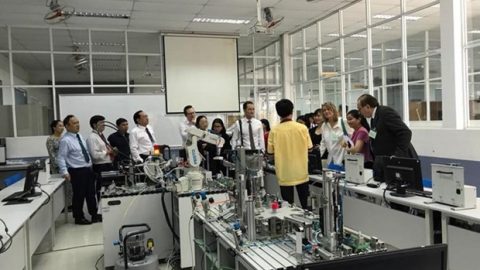
Workers will have to constantly learn to adapt to new technology production lines. (Illustration: Vietnam+)
Along with the application of new technology of businesses, thousands of jobs will be lost and this requires workers to be always ready to adapt to a constantly changing labor market.
To increase labor productivity, Vietnamese enterprises will not be able to lag behind in the 4.0 industrial revolution. As forecast, with the application of new technology of the enterprise, thousands of jobs will be lost and this requires workers to be always ready to adapt to a constantly changing labor market.
Change skill requirements
Former Deputy Minister of Labor, Invalids and Social Affairs Pham Minh Huan said that the industrial revolution 4.0 will improve productivity and economic efficiency. However, it also directly affects workers, creating rejection when “mechanizing” the production process. When businesses restructure and bring technology and equipment, there will inevitably be redundant labor.
The forecast shows that about 75% of the labor force in Vietnam will be affected by the 4.0 industrial revolution. The most affected industries are labor-intensive ones such as textiles, footwear, factory workers, cashiers, etc. Besides, there are many newly emerging industries attracting a lot of jobs. labor force such as industries related to mechatronics, industrial automation, IT, cloud computing, etc.
According to the “Report on career prospects and skill trends in Vietnam for the period of 2018-2022” of Navigos Group, the current jobs with great recruiting demand are forecast to decline sharply in 5 years. due to the impact of the 4.0 industrial revolution. Even the employers themselves share that many soft skills that are being appreciated will no longer be a top priority, but instead are positive learning skills to respond to the change of technology.
Experts said that Industry 4.0 will change the nature of future jobs. However, the biggest impact of this industrial revolution is not necessarily losing jobs but changing job requirements.
In the future, science and technology factors are expected to change the nature of many jobs, leading to the need for more complex skills such as cooperation, evaluation, decision making, and management of people. , creative capacity, etc. In particular, employers believe that positive learning becomes the most essential basic skill of workers.
Improve the quality of human resources
With a total workforce of nearly 56 million people, Vietnam has a great advantage in attracting foreign investment. However, according to the ManpowerGroup report, only 11% of Vietnamese workers are highly skilled. As technological progress changes organizations, the demand for skilled skills also changes rapidly and businesses will have more difficulty in finding talent. An “open” skill for continuous learning will help workers meet new labor market requirements.
Mr. Simon Matthews, CEO of ManpowerGroup Vietnam, Thailand and the Middle East said: “Businesses, governments and schools need to work together to prepare young people to adapt to the future of the world of work when the level of digitization and growth is faster than ever, boosting the global competitiveness of Vietnam’s labor force. ”
Meanwhile, Mr. Gaku Echizenya, General Director of Navigos Group, said: “The labor market is undergoing big changes with the industrial revolution 4.0. Therefore, employees need to actively learn knowledge about digital skills and technology, cooperate with others, manage people, etc to increase competitiveness. “
Also emphasizing the issue of vocational training innovation, Mr. Gaku Echizenya emphasized that the school needs to analyze the future personnel market needs in order to reasonably enroll students, update the curriculum with digital knowledge, and create practical application opportunities for students to improve their knowledge, skills and get ready for career development.
Deputy Chairman of the Committee for Social Affairs of the National Assembly Bui Sy Loi said: Trained labor in Vietnam accounts for just over 60% of the total labor force, of which only about 21% are trained with certificates and training duration of 3 months or more. Therefore, when entering the industrial revolution 4.0, the workforce will face great challenges.
“The State must have the responsibility to orient and identify the training of high quality human resources to meet the 4.0 trend. On the side of businesses, organizations and individuals must do their own research to prepare resources, invest, support workers to access new science and technology, ” Mr. Bui Sy Loi emphasized.